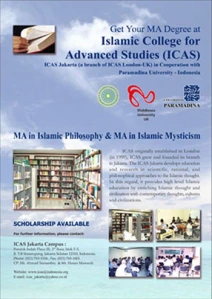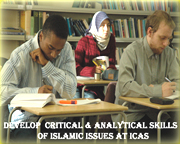COURSE OUTLINE : Islamic Epistemology
| College | ICAS |
| Degree | M.A. |
| Course Title |
ISLAMIC EPISTEMOLOGY |
| Course Code | |
| Status | |
| Level | Postgraduate |
| Credit Hours | |
| Contact Hours | |
| Pre-requisites
(if any) |
– |
| Co-requisites
(if any) |
– |
| Teaching Methodology | |
| Method of Evaluation | |
| Lecturer | |
| Semester Offered | |
| Course Objectives
|
|
| Learning Outcomes | This course is arranged to teach epistemology (theory of knowledge) to the students of MA program of Islamic Philosophy and Islamic Mysticism, in reference to Islamic philosophy in the content and to modern structure and approach in the context in a way by which the students know contemporary philosophical problems and issues. Being arranged in the integrated approach to philosophical issues in general, it is expected that the course enables the students to understand new problems and modern challenges in the philosophical thought. |
| Course Synopsis (course description)
|
Epistemology, which is called the theory of knowledge (al-‘ilm al-ma’rifah), is the branch of philosophy that reflects upon the nature of knowledge. It is a philosophical inquiry into the nature, condition, possibility, value, and extent of human knowledge. It deals with the scope and limits of human knowledge, and with how it is acquired and possessed. It also investigates related notions, such as perception, memory, proof, evidence, belief, and certainty.
Since the domination of modern Western philosophy, which is mainly based on modern epistemology (Descartes, Hume, Lock, Kant), contemporary philosophy encounters the serious problem leading it come to impasse condition. There has been the growing appearance of skepticism in various forms and diverse levels in philosophical discourse at the present. Many contemporary scholars voice the total skepticism about the possibility of human knowledge. Another consequence of this idea is the emergence of relativism, pragmatism, and nihilism. According to post-modernist scholars, there can be no overarching reason, no one true way of looking at things. In contrast to the crisis of modern epistemology (philosophy), Islamic philosophy has continually retained its strong characteristics and has never become the victim of shakiness, upheaval or acute crisis like the Western one. Even though epistemology as a branch of philosophy (a separate science) was started in modern era (17th century), it could be said that the problem of the value of knowledge, which is one of the most central issue in epistemology, has been somehow raised since the early period of philosophy including in the history of Islamic philosophy. According to Sayyid Wahid Akhtar (The Islamic Concept of Knowledge, Al-Tawhid Journal Vol. XII No. 3), it is undeniable that various epistemological issues have been discussed in Muslim philosophy with an orientation different from that of Western epistemology. Today attempts are being made to understand the basic epistemological issues in terms of that orientation. In the Islamic theory of knowledge, the term used for knowledge in Arabic is ‘ilm has a much wider connotation than its synonyms in English and other Western languages. Knowledge in the Western world means information about something, divine or corporeal, while ‘ilm is an all-embracing term covering theory, action and education. Franz Rosenthal (Knowledge Triumphant: The Concept of Knowledge in Medieval Islam, Leiden, 1970), highlighting the importance of this term in Muslim civilization and Islam, says that it gives them a distinctive shape. Perhaps due to that consideration just as above-mentioned in brief, Allamah Thabathaba’i, Shahid Murtada Muthahhari, Muhammad Baqir Sadr, Mehdi Ha’iri Yazdi and Taqi Misbah Yazdi paid attention a lot on the issues and problems of epistemology. In my humble opinion, for them epistemology is very important part of philosophy, and it will be more necessary for today (Richard Rorty declared “the death of epistemology” in his masterpiece The Mirror of Nature). It seems that we should start first of all with this part of philosophy before entering into discussion about being or existence. Because, first of all, we should know how we come to know something. Is it possible to know something? So, after securing the possibility of coming to know something then we can start discussion about existence or being as such. In reference to the above-mentioned description, ICAS will present epistemology in a way that:
|
WEEKLY PLANNER, TOPICS AND READINGS
| Week | Topics | Description of the Topics | Recommended Readings |
| 1 | Introduction to Epistemology: The Importance, Definition, Scope, Benefits
|
||
| 2 | Possibility of Knowledge: Overcoming Skepticism | ||
| 3 | Self-Evident Principles of Epistemology
|
||
| 4 | Discourse on Sources | ||
| 5 | Limit of Knowledge
|
||
| 6 | Divisions of Knowledge into ‘ilm huduri and ‘ilm husuli | ||
| 7 | The Explanation of Characteristics of ‘ilm husuli
|
||
| 8 | The Exposition of Three Types of Universal Concepts (Primary Intelligible, Secondary Philosophical Intelligible, Secondary Logical Intelligible)
|
||
| 9 | The Explanation of the Role of the Intellect and Sensation in Ideas
|
||
| 10 | The Discourse on Value of Knowledge
|
||
| 11 | The Understanding of Characteristics of ‘ilm huduri
|
||
| 12 | The Importance and Relevance of ‘ilm huduri for Theory of Knowledge |
Note:
There are many topics that I don’t entered yet to the list of the syllabi, are:
- Mystical Experience as an instance of ‘ilm huduri
- The Critical Analysis on Empiricism, Positivism
- The Evaluation of Ethical and Legal Propositions
- The Application of Principles of Islamic Epistemology to Clarify Issues and Problems of Contemporary Epistemology
REFERENCES
- M. Taqi Misbah Yazdi, Philosophical Instructions: An Introduction to Contemporary Islamic Philosophy, Binghamton University, New York, 1999 (especially Lesson 11 – 20, pages 85-169).
- M. Baqir Shadr, Our Philosophy, Ansariyan Publications, Qum-Tehran, 2000.
- Mehdi Ha’iri Yazdi, Knowledge by Presence: The Principles of Islamic Epistemology
- Keith Lehrer, Theorry of Knowledge, Routledge, London, 1992.
- Murtada Mutahhari, Sharh Manzumah, part of epistemology (secondary intelligibles)
- Allamah Tabatabaei and Murtada Mutahhari, Usul Falsafah wa Riyalism,
- Muhammad Fanaei, Secondary Intelligibles,
- Paul K. Moser, Dwayne H. Mulder, and J.D. Trout, The Theory of Knowledge, Oxford, 1998.
- Michael Williams, Problems of Knowledge: A Critical Introduction to Epistemology, Oxford, 2001
10. William C, Chittick, The Sufi Path of Knowledge (chapter on Epistemology, pg. 145 – 189), New York, 1989.
11. Sheikh Rais Ibn Sina, Isharat wa Tanbihat Juz Awwal: Mantiq, Qum, 1375
12. _________________, Remarks and Admonitions, Part One: Logic (English edition, translated by Shams C. Inati, Toronto, 1984
List of Topics of Seminar for Islamic Epistemology Course (for discussion)
| No | Topics | Description of the Topics | Recommended Readings |
| 1 | Possibility of Knowledge |
|
|
| 2 | Knowledge by Presence |
the relation of KBP and mysticism |
|
| 3 | Knowledge by Correspondence |
|
|
| 4 | Contribution of Islamic Epistemology |
|





 http://ic-jakarta.org/
http://ic-jakarta.org/







